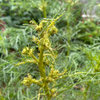Serious impatiens disease spreading fast
ginny12
11 years ago
Related Stories

DIY PROJECTS12 Signs You've Caught the DIY Bug
Been making inventive things from scratch? Repurposing salvaged pieces creatively? It may be more serious than you think
Full Story
CALIFORNIA NATIVE PLANTSGreat Design Plant: Coast Live Oak
The stuff of legends and memories, this California tree is one to build a whole landscape around
Full Story
GARDENING GUIDESGreat Design Plant: Bugle Weed, a Quick Ground Cover
It’s highly adaptable, suppresses weeds, reduces erosion and provide weeks of bright flowers. Just watch for invasiveness
Full Story
GARDENING GUIDESWhat Kind of Roses Should You Grow?
Want to add the beauty of roses to your garden? Find out which ones, from old-fashioned to modern, are right for you
Full Story
EDIBLE GARDENSSummer Crops: How to Grow Tomatoes
Plant tomato seedlings in spring for one of the best tastes of summer, fresh from your backyard
Full Story
GARDENING GUIDESCommon Myths That May Be Hurting Your Garden
Discover the truth about fertilizer, soil, staking and more to keep your plants healthy and happy
Full Story
DECORATING GUIDESFeel Free to Break Some Decorating Rules
Ditch the dogma about color, style and matching, and watch your rooms come alive
Full Story
MATERIALSInsulation Basics: What to Know About Spray Foam
Learn what exactly spray foam is, the pros and cons of using it and why you shouldn’t mess around with installation
Full Story
GARDENING GUIDESBackyard Birds: Invite Entertaining Hummingbirds Into Your Garden
Hummingbirds — unique to the Americas — zip through open landscapes seasonally or year-round. Here’s how to attract them
Full Story
GARDENING FOR BUTTERFLIES3 Ways Native Plants Make Gardening So Much Better
You probably know about the lower maintenance. But native plants' other benefits go far beyond a little less watering and weeding
Full Story








rhizo_1 (North AL) zone 7
Tiffany, purpleinopp Z8b Opp, AL
Related Professionals
Bridgetown Landscape Architects & Landscape Designers · Peabody Landscape Contractors · Boca Raton Landscape Contractors · Gloucester Landscape Contractors · Mahwah Landscape Contractors · Midland Landscape Contractors · New Cassel Landscape Contractors · Northbridge Landscape Contractors · Rockwall Landscape Contractors · Indio Driveway Installation & Maintenance · Freehold Decks, Patios & Outdoor Enclosures · Leander Decks, Patios & Outdoor Enclosures · Orland Park Decks, Patios & Outdoor Enclosures · Pittsburgh Decks, Patios & Outdoor Enclosures · Scotts Valley Decks, Patios & Outdoor Enclosuresginny12Original Author
tsugajunkie z5 SE WI ♱
rhizo_1 (North AL) zone 7
ginny12Original Author
TNflowerlover Zone 7a
eahamel
ginny12Original Author
Cindy
michel7
ginny12Original Author
docmom_gw
ken_adrian Adrian MI cold Z5
Tiffany, purpleinopp Z8b Opp, AL
zen_man
rhizo_1 (North AL) zone 7
Tiffany, purpleinopp Z8b Opp, AL
zen_man
Tiffany, purpleinopp Z8b Opp, AL